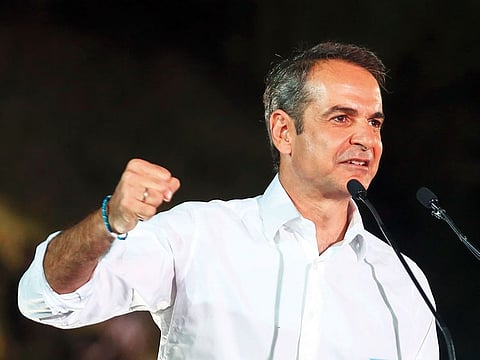Greek dynasty returns to classic roots
Kyriakos Mitsotakis is all but assured to be Greece’s new PM

MADRID: When polling closes Sunday night, it should take just a couple of hours for Kyriakos Mitsotakis to be named the winner in Greece’s general election. His centre-right conservative New Democracy (ND) party has a commanding 10 percentage point lead in opinions polls heading into Sunday’s vote — pretty much ensuring him victory. It will be a stunning turnaround for the 51-year old from a classic Greek political dynasty to lead the nation of 10.7 million.
His father, Konstantinos Mitsotakis, was prime minister in the early 1990s and his sister, Dora Bakoyannis, was mayor of Athens when the city hosted the Olympics in 2004, before becoming Greek foreign minister.
That Misotakis name, together with the socialist Papandreou and the conservative Karamanlis families, have dominated Greek politics for two generations.
When the ND party was dumped out of power in January 2015 by the radical left Syriza led by current Prime Minister Alexis Tsipras, there was a palpable sense of anger — a tarnished leadership swept away. The ND was blamed for allowing the economy to live beyond its means for so long, requiring three humiliating bailouts totalling €242 billion (Dh998 billion), and then for then punishing Greeks with stringent austerity imposed by the European Union, the European Central Bank and the International Monetary Fund.
Kyriakos Mitsotakis was part of that last conservative government, serving as minister for administrative reform with the task of sacking thousands of civil servants to meet the mandated terms of the bailouts.
It was a role that sat uneasily with the former venture capitalist who was educated at Harvard and Stanford in the US. Now, with victory in the Greek election all but assured, it’s a case of what goes around comes around for the Mitsotakis dynasty. In local elections held at the end of May, Mitsotakis’ nephew Kostas was elected the new mayor of Athens.
While ND has conservative policies, Mitsotakis is viewed by analysts as a liberal who has worked hard at reforming the party he took over following its shellacking in two failed election campaigns and a referendum on those austerity measures. Since then, he has effectively targeted Tsipras, accusing him of caving into the demands of Greek creditors.
“Mr Tsipras handed over everything and got nothing in return,” he complained in response to the government’s decision to accept a third bailout from the EU, IMF and ECB.
Last year, when Greece stopped relying on emergency bailout loans, Mitsotakis said economic improvement was too slow.
He has also taken advantage of popular anger at Tsipras’ name-change agreement with northern neighbour North Macedonia, accusing the prime minister of dividing the people of Greece. He has since said though there was little he could do to change it.
ND support surged in European Parliament elections in late May, polling 33 per cent of the vote compared to Tsipras’ party Syriza, who failed to reach the 24 per cent mark. Tsipras was forced to call early elections, and Mitsotakis has effectively campaigned on cutting taxes and resurrecting a hard-hit middle class.



